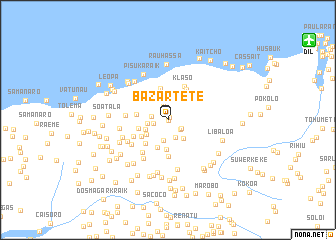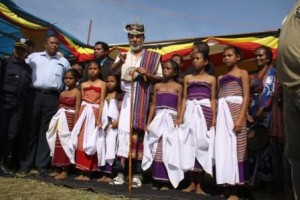Bazartete
Bazartete (also: Bazartete ) is a village, Aldeia and subdistrict in the district Liquiçá in East Timor.
Location and Aldeia
The place is located in Bazartete Suco Fatumasi on a mountain top, 645 meters above sea level, in the rain forest, seven kilometers south-east in a straight line from site Liquiçá. In the town live 3368 (2006). There is also the Aldeia Bazartete. The village has a primary school, a police station, a helipad and a community health center.
During the time of the Portuguese Estado Novo was known as Vila Eduardo Marques, named after the governor of Portuguese Timor Eduardo Augusto Marques ( 1908-1909 ).
The subdistrict
The subdistrict Bazartete forms the eastern part of the district. To the west lies the subdistrict Liquiçá. To the east is bordered Bazartete to the District Dili belonging subdistrict Dom Aleixo, on the southeast by the district to Aileu belonging subdistrict Laulara and on the south by the district Ermera belonging Subdistrikte Railaco and Ermera. To the north is the Savu Sea. Bazartete divided into nine Sucos: Fahilebo, Fatumasi, Lauhata, Leorema, Maumeta, Metagou, Motaulun, Tibar and Ulmera.
In the sub-district 23 955 people live (2010, 2004: 20,190 ). The largest language group consists of the speakers of the national language Mambai. The average age is 18.1 years (2010, 2004: 16.7 years ).
68 % of households cultivate maize, cassava, 62%, 50 % coconut, 48% vegetables, 43 % of coffee and only 2% rice.
29 km west of Dili lies on the coast Bekas Penjara Aipelo, a Portuguese prison from the 19th century. The striking ruins are now a tourist attraction. On the Bubble Beach in Suco Lauhata volcanic gases rise from the sea floor. The area is also a popular diving area.
The father of the politician and freedom fighter Nicolau dos Reis Lobato comes from the Suco Leorema.
History
Ulmera was one of the traditional kingdoms of Timor, which were ruled by a Liurai. Dominated by the Tetum kingdom appears on a list of Afonso de Castro, a former governor of Portuguese Timor, who performed 47 kingdoms in 1868.
In the spring of 1861 broke out against the forced labor on public projects here one of the revolt of 1861 against the Portuguese colonial rule. Governor Afonso de Castro struck down in September of the same year. It is speculated that had Dom Carlos, who Liurai of Maubara, the kingdom of Ulmera incited to rebellion. He had not resigned despite a good persuasion of the Dutch with the Portuguese as new men.
1863 came in Fatumasi to revolt. With the defeat of the Portuguese were here supported by the rulers of Ermera. 1889 a customs station was built in Aipelo.
On December 7, 1975 landed at Ponta Tibar heavy landing craft of Indonesians. This was part of the invasion is occupied as a consequence of East Timor.
The end of 1979 were in Leorema, Raucassa ( Suco Lauhata ) Tibar and in place Bazartete Indonesian resettlement camp for East Timorese should be relocated for better control of the occupiers. The population declined in the sub-district between 1970 and 1980 from 16,610 to 8,997 by 45.8 %.
The subdistrict Bazartete was in 1999 during the riots before and after the independence referendum scene of intimidation, rape and murder by members of the Besi Merah Putih militia. Two weeks terrorized the BMP population and forced many to flee to West Timor, or deported the people there. In Fatumasi 70 to 80 % of the buildings were destroyed. Also in Vila de Liquiçá most of the buildings were damaged. On October 13, an Australian infantry company was stationed in the deserted city of security. Only gradually returned to the inhabitants.
On May 24, it came with Tibar during the riots in East Timor in 2006 fighting between members of the defense forces of East Timor and mutinous soldiers.










